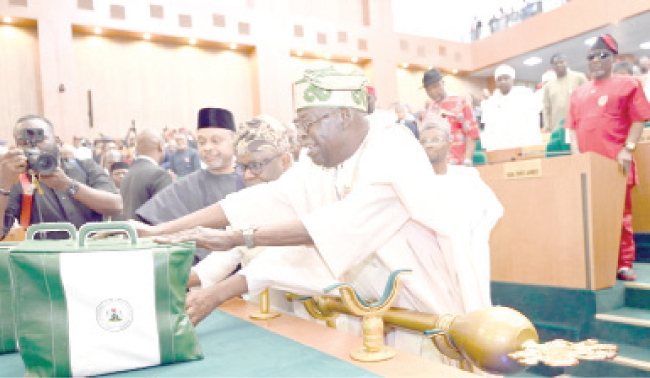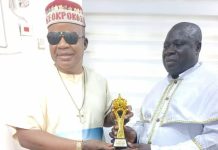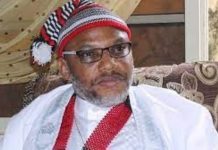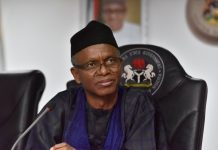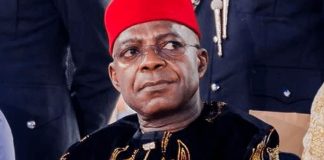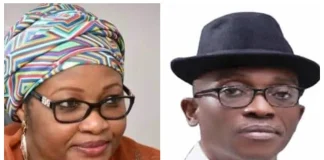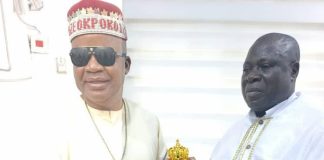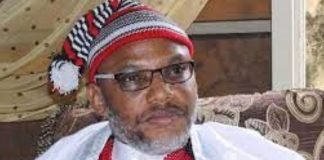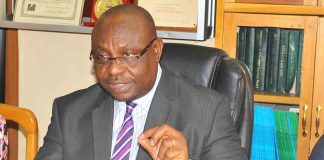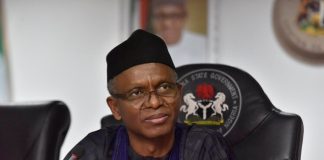🌿 Ruzu Non-Alcoholic Herbal Bitters
Ruzu Non-Alcoholic Herbal Bitters is a natural health supplement specially formulated to:
- ✅ Promote general wellness
- ✅ Detoxify the body
- ✅ Support the treatment of various ailments
Made from a powerful blend of 100% organic and medicinal herbs, Ruzu is completely alcohol-free, making it ideal for:
- 👪 All age groups
- 🌱 Health-conscious individuals
- 🌿 Anyone seeking non-alcoholic herbal remedies
Whether you're looking to boost your vitality, cleanse your system, or support healing the natural way, Ruzu Bitters offers a trusted herbal solution.
Another cycle of budget presentation by the president to the National Assembly has begun. KUNLE ODEREMI writes on the role of the Ministries, Departments and Agencies (MDAs) in the implementation of federal budgets, as well as the recurring poser on the inability of parliament to effectively assert itself by monitoring budget performance as well as carrying out its other oversight activities in the last 25 years.
Checks and balance is a cardinal valve designed to ensure the separation of powers in a civil democracy. The separation of powers ensures that each arm of government operates in consonance with its functions and mandate as enshrined in the constitution. This arrangement is expected to guarantee transparency, accountability as the executive with powers to formulate policies is not bestowed with the authority to appropriate. Neither is the legislature empowered to execute projects, which is within the responsibilities of the Ministries, Departments and Agencies (MDAs). However, there has been consistent public concern on the role of the MDAs in implementing federal budget over the years. The issue has become a recurring decimal in the relationship between the National Assembly and the MDAs with the former occasionally threatening to sanctions those agencies if the executive arm of government fails to call them to order. There were instances the parliament invited the heads of such agencies to appear before ad hoc committees to clarify issues pertaining to the mandates, but which the heads of the ministries, department and agencies were treated with levity or ignored. Miffed by the disdain for the power guaranteed under the constitution, the lawmakers often either warn them to honour such invitations or risked severe sanctions. More often, however, the matter, which usually bothered on the management of huge state resources appropriated to the agencies soon pales into insignificance due to the apparent lack of the will by those that have alleged to go beyond ‘hallucination,’ not necessarily for the want of substance. From the tenure of the first president in 1999 till date, therefore, issues arising from the audited reports of the Auditor General of the Federation indicting the MDAs have pitched the lawmakers with indicted MDAs.
The provisions of Section 4, Sub-section one of the 1999 Constitution, as amended, establish the status of that the Senate and the House of Representatives. Each chamber comprises 109 Senators representing three Senatorial Districts of each of the 36 States of the Federation and senators and 360 House members, to underscore the fact that the parliament is at the core structure of power calculus in guaranteeing good governance and accountability. It shows the centrality of the National Assembly in a democracy and the power of appropriation. Along with such power is the oversight function, which allows the National Assembly to hold MDAs accountable to the public over public funds allocated to them in a budget circle. Complementing such authority is the investigative power conferred on the parliament under Sections 88 and 89 of the constitution. The framework legitimises the National Assembly to summon individuals or authorities for investigations to clarify contentious issues surrounding sleaze and activities of government or government generally.
The current Speaker of the House, Honourable Tajudeen Abbas, acknowledges that the oversight function of the parliament is crucial to holding the executive arm of government accountable. At a recent workshop organised by the directorate of planning and legislative budget of the National Assembly in Abuja, on the theme: “Assessment of the national monitoring and evaluation policy of Nigeria and the role of legislator,” Abbas, who was represented by Honourable Mohammed Bio, Chairman, House Committee on the Legislative Budget, Abbas said the agenda of the 10th assembly is to ensure that through oversight, “our commonwealth is properly managed for the benefit of all Nigerians.”
However, the trajectory of the country on the oversight function of the National Assembly is a mixed grill in the last 25 years. Various reports leave a savoury taste in the bud. For instance, a study entitled: Oversight Functions of the National Assembly in Nigeria: Issues and Challenges, by the trio of Tahir Mohammed Sani, Abraham Musa Peter and Aminu Ibrahim established that there has not been sufficient legislative oversight role played in the manner that can result in enhance executive Accountability. It also showed that while legislative oversight role of the parliament was active in the life of the 8th Assembly, a diminishing set in the 9th assembly, weakening the capacity of the parliament in promoting executive accountability. The scholars affirmed that corruption and leadership collusion by both the legislatures and executive during appropriation, approvals and management of infrastructural development funds to be the major challenge weakening legislative oversight and in extension the accountability of the executive. For instance, in 2001 the Senate Committee on Public accounts investigated the Nigerian National Petroleum Corporation (NNPC), the Central Bank of Nigeria (CBN), and the defunct National Electric Power Authority (NEPA) and raised a lot of controversies on the activities of their administrative bodies. The committee discovered sharp practices and secret bank accounts maintained by public officials. Several ministries, parastatals and agencies were accused of keeping between 200 and 300 billion of public funds in such illegal accounts in four years.
In another example, the Senate Committee on Privatization of the Nigerian Airways Limited (NAL) and the establishment of new national airlines indicted top government officials and the leadership of the Bureau for Public Enterprises (BPE). More curious was the outcome of the investigation carried out by the National Assembly into the Petroleum Trust Development Fund (PTDF) brouhaha. The Senate Review Committee Reports on the PTDF indicted the elected leaders of the country for undermining the laws for setting up the fund and misapplying its ample funds without achieving a meaningful infrastructural development.
What the 1999 Constitution says
Under the 1999 Constitution, the functions of the parliament are enshrined in sections 4 (1) and (2) for the federal and sections 4 (6) and (7) for the state legislatures) is mainly to make Laws. As part of the process of making Laws, each House of the National Assembly is given the power to summon before it and question a minister about the conduct of his ministry, particularly when the affairs of that ministry are under consideration. The power is given to the National Assembly in subsection (2) of section 67 which provides that:
“(2) A minister of the Government of the Federation shall attend either House of the National Assembly if invited to explain to the House the conduct of his Ministry, and in particular when the affairs of that Ministry are under discussion.” A state House of Assembly derives a similar power under subsection (2) of section 108 with respect to state commissioners.
Budgeting Ritual
President Bola Tinubu, on Wednesday, December 18, presented the N47.90 trillion federal estimates for 2025 to the 10th session of the National Assembly, which, according to him, depicts the fulfillment of his constitutional duties and unyielding commitment to rebuilding Nigeria. The president noted that the 2025 budget is coming at a time when the country is at a crucial point in its development history. “The 2025 budget that I present today is one of restoration. It seeks to consolidate the key policies we have instituted to restructure our economy, boost human capital development, increase the volume of trade and investments, bolster oil and gas production, get our manufacturing sector humming again and ultimately increase the competitiveness of our economy.
“We do not intend to depart from this critical path to strengthen the Nigerian economy. Just as I believe in the resilience of our economy to withstand the current challenges, I also strongly believe in the resilience of the Nigerian people. Again, I summon the unstoppable Nigerian spirit to lead us on as we work to rebuild the fabric of our economy and existence,” President Tinubu said.
The president asserted that central to the fiscal estimates is advancing national security, creating economic opportunities, investing in the youthful population, infrastructure development, and national re-orientation. “More than that,” he added, “this will lay a solid foundation for Nigeria’s future growth trajectory” as his administration, Tinubu stated, was able to attain remarkable milestones in implementing the 2024 budget.
Domino effects
Sources said the authorities are making frantic efforts to strike a balance in the ratio of revenue to the Gross Domestic Product, and one of the ways it plans to achieve it is through a seamless taxation policy which that can cushion the effects of budget deficits. Recall that in the incoming fiscal year, the government plans to rake in a whopping N34.82 trillion in revenue, whereas it envisages a staggering N47.90 trillion expenditure, with N15.81 trillion meant for debt servicing. A total of 13.08 trillion naira, budget deficit is to be financed through foreign loans. But the issue triggered by tax reform bills in certain sections of the stakeholders is said to have delayed the presentation of the 2025 budget before the parliament. Therefore, experts say the authorities must work out a strategy that will ensure proper, efficient and controlled management of the budget, with the MDAs crucial, critical and important to the overall goal.
Despite the scepticism of critics on the political will of the present parliament, the leadership is giving hope about the readiness of the National Assembly to do the needful in treating the 2025 budget. The President of the Senate, Godswill Akapbio, has tried to put the MDAs on their toes; that it may no longer be business as usual. He has told them that their heads should not hesitate to prompt honour invitations from the National Assembly to budget defence, with a promise that the parliament would not hesitate to wield the big stick against any erring MDAs. “Let me take this opportunity to stress the importance of ministers and heads of extra-ministerial departments to be prepared to respond promptly to requests for them to come and defend their sectoral allocations. This is in the exercise of our legislative oversight.
“We have observed behaviours from some ministers and heads of extra-ministerial departments who sometimes neglect their duties to promptly submit to legislative oversight, sometimes even disregarding invitations from relevant committees of the legislature. It is imperative they understand that we will not condone such breaches of the constitution, going forward,” he said. But, critics like Mr Bayo Omiwole, a historian who has consistently followed the trajectories of the Nigerian parliament since 1999, is taking the subtle threats of the president of the Senate against the MDAs with a pinch of salt. He says he has tracked the activities of the 10th National Assembly since its inception last year such that he doubts its political will to confront the MDAs.
Similarly, a former top military officer, who craved not to be mentioned, talked about what he called the conspiratorial mentality in the civil service that is averse to change. According to him, certain forces in the establishment will fight doggedly to preserve the status quo that promotes and sustains malfeasances. The highly controversial ex-military officer queried? “To what extent can the parliament go the full hog since its threats in the past over disobediences by MDAs were treated with scorn, ignominy and disdain?”
About two weeks ago, the Senate Committee on Finance raised an eyebrow following claims of poor capital releases to MDAS for executed projects for the current fiscal year. It called for the detailed report on the remittances certain agencies into the government purse, just as the committee noted the discrepancies in revenue generation and expenditure tracking. Consequently, it threatened the indicted MDAs that they risked zero allocation for MDAs if they should fail to honour invitations by the parliament to defend themselves of the infractions. The occasion was the time the Accountant General of the Federation, Mrs Oluwatoyin Madein, appeared before an investigative hearing conducted by the committee on the remittance of internally generated revenue, fiscal accountability, and the general financial management system of the country. The Chairman of the Senate Committee on Finance, Senator Sani Musa, raised the issue of financial inconsistencies in government agencies, which negates the principle of transparency and accountability in governance. “We should be able to determine, at any point, the exact state of revenues collected, how they’ve been disposed off, and what has been allocated to various accounts. Unfortunately, that is not the case today,” Musa said.
According to the Committee, the key areas of concern include the discrepancies in reports from the Nigerian National Petroleum Corporation (NNPC) and the federation account, the dividends received from LNG operations, and other significant variances.
The Committee also underscored the need for clarity on loans, grants, and other financial inflows managed by the government.The reported figures included: Independent revenue of ₦2.7 trillion, Operating surplus from Government-Owned Enterprises (GOEs) amounting to ₦2.3 trillion and Ministries, Departments, and Agencies (MDA) internally generated revenue (IGR) of ₦344 billion. The core issues that came to the fore included alleged corruption and low revenue from Stamp Duties, bureaucratic bottlenecks, while the lawmakers frowned about contractors being required to pay under-the-table fees, reportedly 5 percent of the contract value, to expedite their payments, which they warned amounts to a major accountability issue and efficiency if the allegation is true. Other posers that emanated from the encounter bothered on inefficiencies in payment systems, budget escalations, and concerns about revenue accountability. Thus, the committee resolved to invite the Revenue Mobilization Allocation and Fiscal Commission (RMAFC), the Nigerian Extractive Industries Transparency Initiative (NEITI), and the NNPCL, for a joint session to ensure a comprehensive review of the discrepancies.
Search for solution
Last year, the Senate, at a two-day retreat in Ikot-Ekpene, Akwa Ibom State, came up with the comprehensive strategies. The retreat was at the instance of the National Institute for Legislative and Democratic Studies (NILDS). The communiqué of the exercise read: “The situation where many agencies of government are involved in collecting taxes and new laws continue to make it the responsibility of these agencies to collect taxes should be halted, through a legislative resolution. Bills on taxes should be presented as Executive Bills and not as private member Bills; there is a need to review the tax waiver policy to ensure it is aligned with the revenue mobilization drive of the government by making the waiver process more transparent and accountable. “To address exchange rate management issues, challenges of inflation, address poverty, and create jobs, there is a need to consider and approve the Emergency Economic Intervention Bill from the Executive as a proposed legislation from the Presidential Committee on Fiscal Policy and Tax Reforms.”
It was also the position of the Senate that clear and transparent guidelines for revenue retention should be established with a proviso that, “ The government should establish clear and transparent guidelines for the amount of revenue that revenue-generating institutions are allowed to retain,” and that the guidelines should be based on objective criteria, such as the institution’s verified operating costs and investment needs by the relevant authorities and committees of the National Assembly. “
On its part, the Economic and Financial crime Commission (EFCC) initiated a process for tracking disbursements to MDAs. It enables the commission to access the Integrated Personnel and Payroll Information System (IPPIS) to monitor government disbursements to MDAs. “This access will enable the EFCC in tracking all disbursements and ensure proper utilisation,” Mr Olukoyede said during an oversight visit by the Senate Committee on Anti-Corruption and Financial Crimes to EFCC head office in Abuja. We now have a relationship with the Accountant General’s Office through which we’ll monitor disbursements to prevent the funds from being stolen.
“There will be no problem. We will monitor the allocation, and I believe you will also help us champion this cause,” he said. Following the interaction, the chairman of the legislative committee, Senator Udende Emmanuel, promised an increased budgetary allocation to the EFCC in order to effectively carry out its duties.
Olukoyede lamented that some insecurity challenges confronting Nigeria could be traced to corruption in the area of MDAs expenditure, due to diversion but with some arrests already made by the commission. “One of the critical issues contributing to our current problems is corruption. Some of the money allocated to certain infrastructure projects has been diverted, or, upon its application, we don’t get value,” he said.
Other concerned stakeholders, including scholars like Nsirimovu, Okwuwada have also underlined the complexity of organised corruption within the ranks of those he described as “the privileged few, especially those on the front lines of public service.” In his paper with the title: Organized corruption an impediment to the socio-economic survival of Nigeria: An MDAs perspective, he noted that corruption has not only permeated every segment of the population but also emerged as one of the most potent variables influencing the distribution of social amenities and opportunities in the country.” Civil society organizations have equally embarked on the frantic search for a system that is relatively insulated against gross abuse in the machinery of government. In one of such initiatives, the CSOs were in doubts about the efficacy and efficiency of the existing internal audit system in the fight against the wave of corruption in MDAs) at all levels of government. They raised the concern at a one-day anti-corruption situation room, organised by Human and Environmental Development Agenda (HEDA), in collaboration with the Society for West African Internal Audit Practitioners (SWAIAAP), in Abuja. One of the stakeholders at the occasion was the Auditor General of the Federation, Andrew Ogochukwu Onwudili, reportedly decried the ugly trend in the public sector and canvassed for reform and strong internal control measures. While acknowledging some pragmatic steps taken by the authorities to check further abuses in the system and improve good governance, he said there is still room for improvement. “It is instructive to note that the Federal Government of Nigeria (FGN) has already established Internal Audit functions in all the Ministries, Extra-Ministerial Offices, and Agencies as part of their internal control and governance structures where the Accountant- General of the Federation is responsible for posting Directors/Heads of Internal Audit in line with paragraphs 1701 & 1702 of the Financial Regulations, 2009. Despite the above, there is a need to strengthen the internal audit functions across the Government Entities because they are what we can call “the first line of attack” against corruption.
“They are expected to be part of the internal control measures of the FGN to ensure that corrupt practices such as fraud, errors, and misstatements do not happen. That is, the internal controls work efficiently to safeguard public assets and to ensure they are not diverted for private use.
“Generally, we can say that internal controls are put in place to ensure that fraud, errors, or misstatements are prevented from happening, and when they happen, they are detected on time, and appropriate corrective measures are taken immediately.”
Calling for the independence of internal auditors in MDAs, Onwudili, said that: “To ensure an inclusive fight against corruption in Nigeria, there is a need for the Financial Reporting Council of Nigeria, to publish a Corporate Code of Governance for the Public Sector that will see to the creation of an Audit Committee that the Internal Auditor can be reporting to and who will have the requisite skills to act on their reports.”
At the sideline of the retreat, Chairman, HEDA, Olanrewaju Suraju, said the National Assembly should be taken to task on what has been the situation in terms of the “level of fleecing of national resources since 1999. Citing the damning report by NEITI on the audit of 2021 in the extractive sector, which stated that about the non-remittance and misapplication of over $80 billion, he declared: “You can imagine what that would do to the country and this is due to the fact that the National Assembly, as an institution, has woefully failed to respond to annual report from the Office of the Auditor General of the Federation; and without the National Assembly actually, the baiting and adopting the report, it remains something seem not better than just a mere work in progress.”
In the sustained campaign against corruption, the authorities established Anti-Corruption and Transparency Units (ACTUs) in all MDAs. The initiative was at the behest of the Independent Corrupt Practices and Other Related Offences Commission (ICPC), whicvh it said is aimed at promoting integrity and transparency within the civil service. At the launch, civil servants were tasked on their role in upholding ethical standards as they are charged with safeguarding public trust.
In November 2023, the ICPC) indicted 98 MDA of presenting their financial reports to the office of the accountant-general. In a report entitled; “Ethics and Compliance Scorecard of MDAs of the federal government of Nigeria 2023,” the agency said it scrutinised 368 MDAs spread across the 36 states and the Federal Capital territory (FCT). “Ninety-seven MDAs (26.36%) did not conduct annual needs assessments preparatory to procurement in compliance with the provisions of the Public Procurement Act 2007 while 59 MDAs (16.03%) did not have annual procurement plans in line with their approved annual budgets,” the report revealed.
“Eighty-five MDAs (23.10%) did not have guidelines for granting advances to staff, 67 MDAs (18.21%) did not make retirements on advances when due, while 88 MDAs (23.91%) did not ensure personnel retired advances before granting fresh ones. This is a huge corruption vulnerability as advances remain one of the conduit pipes through which funds are diverted.”
It added that 299 MDAs did not encourage systems study and corruption risk assessment, just as 33 failed to implement the recommendations from such studies. According to the report, 119 MDAs did not have a strategic plan, which determines the organisation’s direction, allocation of resources required and evaluation of processes. Therefore the ICPC recommended that the attorney general of the federation (AGF) and minister of justice should institute urgent measures to ensure that public bodies without establishment statutes have relevant legislation enacted for the legitimacy of their existence and operations.
Rewriting the narrative
The attainment of the aim and objectives of the budget is dependent on a number of salient factors, among them, the human resource, which makes the personnel of the MDAs pivotal. In all this, competence, transparency and efficiency form the integral part of the machinery meant to be deployed in driving the process, implementation and evaluation of projects and commitment of the scarce resources as contained in the budget proposal. Has there been any symbolic paradigm shift to warrantee confidence and rekindle hope in the institutions, structures and bureaucracy designed to guarantee and sustain those ideals over the years? But how prepared are the MDAs towards raising the ante in terms of budget performance? What is the guarantee of forging a synergy with the executive when sometimes, cabinet members often publicly denounced the rising project failure, and threaten contractors with revocation of title deeds? President Tunubu has declared his intention to double his efforts at tackling core challenges and admits the country is caught in the nexus of sleaze and insecurity, as well as inertia of the past leaderships. “Our 2025 budget proposal is not just another statement on projected government revenue and expenditures. It is one that calls for action.
“Our nation faces existential threats from corruption and insecurity and suffers from many past poor choices. These challenges are surmountable when we work collaboratively to overcome them. We must rewrite the narrative of this nation together, with every leader, institution, and citizen playing their part.” Will the situation be a sharp contrast to the past, whereby the three arms of government engaged in diatribes, buck-passing and blame game for obvious lapses, failures and outright denial of the citizens of the benefits of the humongous resources coming from taxation? Can Nigerians indeed heave a sigh of relief of redemption based on the assertion by the president that Nigeria is at the dawn of eureka? To quote Mr President, “The time for lamentation is over; this is a time to act; a time to support and promote greater investment in the private sector; a time for our civil servants to faithfully execute our policies and programmes. It is a time for every Nigerian to look hopefully towards a brighter future because a new day has dawned for us as a nation.”
READ ALSO: 2025 budget: Tinubu, Shettima to spend over N9bn on travels, refreshments

